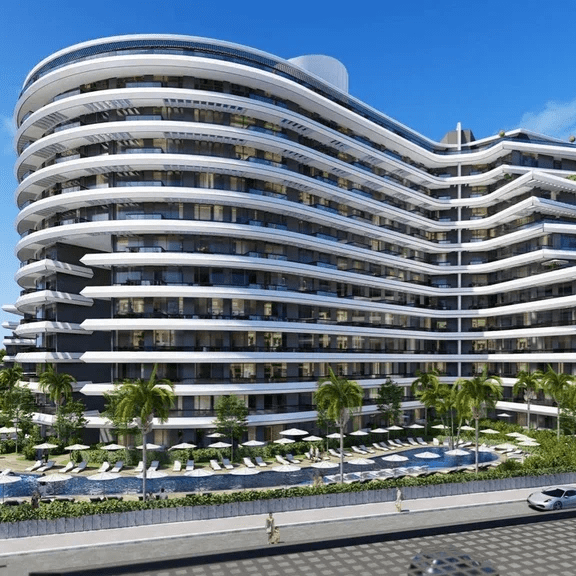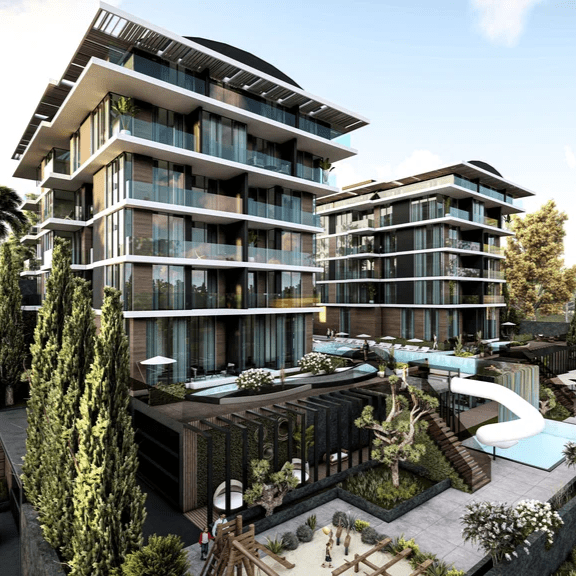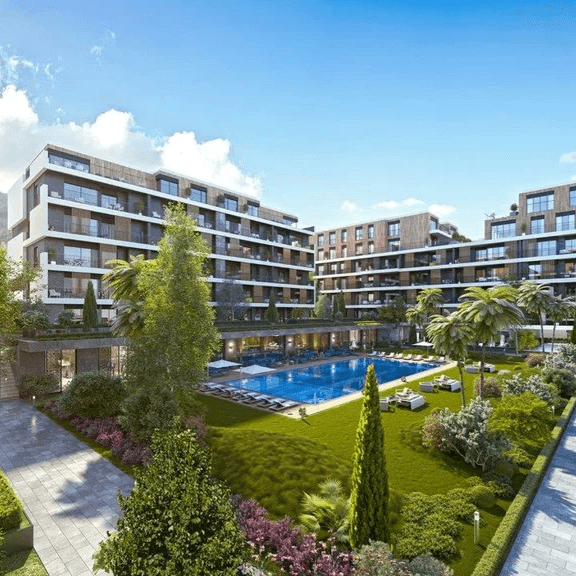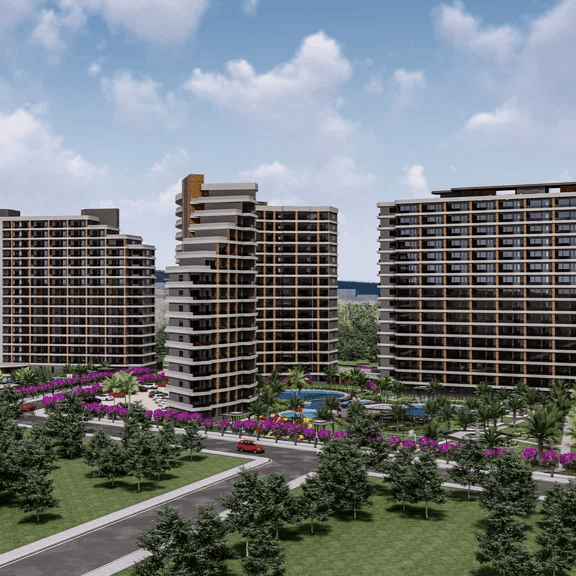For numerous years, Turkey has been a year-round family resort destination, offering a mild climate, warm seas, and all-inclusive hotels. The country's macroeconomic stability and foreign policy have further solidified its popularity among individuals relocating for various reasons. In this article, we will delve into the latest developments in the Turkish real estate market in 2023.
Housing Demand and Prices
In addition to its popular resorts, Turkey is gaining recognition for its rapidly expanding economy. As of the second quarter of 2023, the country achieved an impressive year-on-year GDP growth rate of 3.8%, ranking second among OECD nations and third among G20 countries. However, it's important to note that Turkey is also grappling with a significant challenge in the form of soaring inflation. Unofficial sources suggest that annual inflation reached a staggering 128% in August, a sharp increase compared to the historical annual average of 10.9% between 2000 and 2021.
So, what's happening in the Turkish housing market? Demand for real estate in Turkey has been steadily increasing over the past several years. From 2013 to 2022, the market saw over one million residential real estate transactions annually. Even in 2020, despite the pandemic, there was a record number of deals, totaling almost 1.5 million. This surge in 2020 can be attributed to the reduced interest rates on mortgages, with 38% of transactions that year involving mortgage financing. In contrast, in previous years, this percentage did not exceed 20%.
Following the earthquake in February 2023, there was a decline in the number of real estate transactions. In January, there were 97 thousand transactions, and in February, the number dropped to about 80 thousand, representing an 18% decrease. By the end of the first half of 2023, this decline had further increased to 22%.
In July, there was an improvement in the situation, and the real estate market began to recover. Housing sales in July 2023 increased compared to the same month the previous year, totaling 109.5 thousand properties sold. Istanbul accounted for the largest share at 14.4%, with 15.7 thousand sales. Ankara followed with 9.68 thousand properties sold, representing an 8.8% share, and Izmir with 5.2 thousand sales, holding a 4.7% share. On the other hand, provinces with the fewest sales included Ardahan with 27 properties sold, Hakkari with 40 sales, and Tunceli with 91 properties sold.
Kusadasi, Turkey. Photo: piqsels.com
The Central Bank of the Republic of Turkey (CBRT) reports that from April 2022 to April 2023, the value of residential real estate has increased in all regions of the country, with the most significant growth observed in the provinces of Trabzon, Kocaeli, and Sakarya, where prices have risen by 142%. In major cities, the most notable price growth has been recorded in Istanbul (120%), Izmir (127%), and Ankara (138%).
Generally, real estate prices in Turkey have risen by 132.84% compared to the same month of the previous year.
Analysts predict that prices for flats and other types of properties will continue to rise until the end of the year, albeit at a slower growth rate. However, it is unlikely that prices will start to decline. The ongoing demand is driven by a challenging geopolitical environment, and there is no shortage of people interested in buying or renting real estate in Turkey.
Rental prices for flats in Turkey have also increased significantly, nearly doubling in 2022 alone. It is evident that property owners are raising their prices when selling real estate.
Infrastructure development is also contributing to the increase in property prices. Two new underground lines in Istanbul are nearing completion, and there are plans for an underground network in Mersin. Additionally, there are future projects such as high-speed railways, highways, and bridges in the works. Experts anticipate that the successful execution of these projects will further impact the growth of housing prices.
New buildings in Turkey
Average Real Estate Prices in Turkey in April 2023
City | Price per 1 square metre | Residential property price |
Istanbul | 28 057 TRY ($1,037) | 3 252 906 TRY ($120 340) |
Izmir | 23 306 TRY ($862) | 2 897 750 TRY ($107,201) |
Kocaeli | 15 474 TRY ($572) | 2 011 620 TRY ($74 419) |
Sakarya | 14 280 TRY ($528) | 1 713 600 TRY ($63 394) |
Ankara | 13 662 TRY ($505) | 1 770 860 TRY ($65 512) |
Trabzon | 13 141 TRY ($486 | 2 103 520 TRY ($77 819) |
Source: Immigrant Invest website
Turkish Primary and Secondary Property Market
Secondary housing in Turkey is in high demand and experiencing substantial price growth. By the end of 2022, secondary real estate accounted for 69% of all transactions, and in the first half of 2023, it represented 70% of the market. Price increases in the secondary market are more pronounced compared to the off-plan market, with prices rising by 176% as of November 2022, compared to 164.5% for off-plan properties.
The percentage of mortgage transactions involving secondary real estate in 2022 and the first half of 2023 is approximately 20%. In the primary market, the ratio is similar, but banks typically approve mortgages only for properties that are completed and commissioned.
Purchasing both new and secondary properties has its advantages and disadvantages. One drawback of the primary market is that buying new property often entails involvement in ongoing shared construction projects, necessitating careful selection of the developer. This can be challenging for foreigners unfamiliar with the intricacies of the local market.
The advantage of new buildings is that apartments come with finishes, and the complexes are constructed according to modern standards.
Secondary housing has its advantages. For example, properties are located in already established areas with all the necessary infrastructure, and flats and houses are often sold with furniture. You can also negotiate the price, which is another benefit. However, when purchasing a property on the secondary market, you need to be aware of possible legal risks associated with existing encumbrances.
Istanbul, Turkey. Photo: piqsels.com
Why Foreigners Choose to Live in Turkey
In many ways, the demand for Turkish real estate is driven by foreign buyers. There are several reasons for this, which have a short but vivid history. The Turkish real estate market opened to foreign buyers only in 2002. Back then, they were allowed to buy real estate in only a few areas, and according to the reciprocity reservation, only citizens of countries that provided reciprocal rights to Turkish citizens could do this. Such countries included, for example, the UK, Germany, and the Netherlands. In 2005, the restrictions on areas were lifted, but the reciprocity principle remained.
This rule was completely lifted in August 2012, and since then, citizens of 183 countries have been allowed to buy property in Turkey. The size of the land plot that foreigners can buy without special permission was expanded from 2.5 to 33 hectares.
Since January 2017, Turkey has been granting citizenship to foreigners through various means, including real estate investment. The threshold amount has changed several times. Since June 2022, you can become a Turkish citizen by purchasing a property valued at least $400,000, based on the assessed valuation at the exchange rate on the day of valuation. You can obtain your passport within 3 to 4 months after the purchase. However, you cannot buy a share in the property to qualify for citizenship. There are other restrictions on property purchases for citizenship as well; only one investor can apply for citizenship for the purchase of one property. Previously, the law allowed shared ownership for citizenship if the price met the criteria.
Some areas in popular Turkish cities have been restricted for citizenship applications. Currently, there are nearly 1,200 neighbourhoods where the foreign citizen population has exceeded 20% in relation to the local population.
Izmir, Turkey. Photo: piqsels.com
Participants in the Turkish citizenship program can purchase residential or commercial real estate, as well as land plots. After three years, you have the option to sell your property. Alternatively, there is a more affordable but longer route: buying property worth $75,000 in major cities or $50,000 in other regions, with the potential to obtain citizenship within five years. However, you cannot sell the property you acquired for the purpose of obtaining Turkish citizenship for three years after the initial purchase.
There are other investment options, such as government bonds or starting a business that would create job opportunities for Turkish citizens. Both of these options require a minimum investment of $500,000.
The following requirements apply to the applicant, in addition to having the necessary funds: being at least 18 years of age, having medical insurance, no prior legal issues, no previous violations of the country’s visa rules, and not holding citizenship in a blacklisted country (Armenia, Cuba, Nigeria, North Korea, and Syria).
Several other factors influence the situation regarding real estate purchases by foreigners. One of them is the recent presidential elections, which were preceded by controversy over the citizenship by investment program. Some political parties expressed their intention to cancel the program or even impose a complete ban on foreigners buying real estate.
These statements, along with the February earthquake and other factors, have led to a significant decrease in foreign demand for Turkish real estate. As a result, home sales in the first half of 2023 (January to July) have declined. According to TurkStat, the Turkish Statistics Institute, foreigners purchased 22,076 properties during this period.
In July 2023, foreigners purchased 2,801 properties, accounting for 2.6% of all housing sales in the country. The majority of these homes were sold to foreign buyers in Antalya, with 996 deals. Istanbul followed closely with 832 deals, and Mersin had 263 deals.
Russians led the way with 772 deals, followed by citizens of Iran with 272 deals, Iraq with 204 deals, and Ukraine with 146 deals.
Analysts say the Turkish housing market remains one of the most attractive for foreigners due to a number of external and internal reasons.
Despite the tightening of migration policies, Turkish authorities offer some of the simplest and most reasonable conditions for foreigners to obtain residence permits and citizenship. Some experts believe that European buyers may become more active in the Turkish real estate market in the near future. In fact, there is already some activity: in 2022 alone, the number of German investors increased by 11.5%, British investors by 12%. Additionally, demand among the Chinese increased by 22%, indicating good prospects for the development of the Turkish housing market.
Top Turkish Cities for Buying Real Estate
When considering regions and cities for purchasing real estate, buyers focus on the cost of properties and the potential for price growth. Today, Istanbul, Ankara, Alanya, Antalya, and Mersin remain among the most popular places for investment.
Istanbul is Turkey's bustling metropolis with a population of 15 million people. The city attracts millions of tourists, businesspeople, and immigrants every year.
Real estate in Istanbul has good rental potential, but the market here is highly competitive, resulting in relatively lower returns. A study by Global Property Guide conducted in November 2022 revealed that rental yields for flats in Istanbul range from 2.5% to 12.7%, with an average of 6%.
The market in the country's capital, Ankara, is also popular among investors. This city attracts businesspeople, ensuring a steady demand for the purchase and rental of flats. Rental yields in Ankara range from 4.05% to 11.41%.
The resort towns of Alanya and Antalya offer a wide selection of primary and secondary properties. Meanwhile, the prices for resort housing in Turkey are several times lower than in traditional European resorts. These seaside towns are especially popular among expats. Rental yields in Antalya range from 3.66% to 7.99%.
The situation is similar in other cities. Rental yields in Izmir vary from 3.69 to 13.42%, in Adana from 2.92 to 6.98%, and in Bursa from 3.31 to 7.01%.
The seaport city of Mersin has also been dedicated to developing tourism in recent years, which has led to a construction boom and significant growth in social infrastructure. Experts predict that in the coming years, Mersin will offer the most substantial returns on investment in local real estate.
Investors are also considering other cities, such as Belek, Side, and Fethiye.
The city of Bursa is gaining popularity, especially among Middle Eastern buyers, although it remains relatively unknown to Europeans. Real estate in Bursa is still affordable, but the recent construction of the new Osmangazi Bridge has significantly reduced travel time to Istanbul, which may lead to price increases in the city in the medium term.
Antalya, Turkey. Photo: piqsels.com
Taxes and Fees in 2023
All real estate buyers, whether residents or non-residents, are subject to taxes. The first is a property purchase tax, which amounts to 4% of the property's value and must be paid before finalising the deal.
When purchasing a primary property, you are required to pay a Value Added Tax (VAT) ranging from 1% to 18%, depending on the type of property and its floor area:
- 1% for flats or houses of up to 150 sq. m.
- 8% for flats or houses exceeding 150 sq. m.
- 18% for commercial properties.
Non-residents who buy real estate from a developer can apply for a VAT refund. However, these buyers cannot be tax residents, meaning they are not allowed to reside in the country for more than 180 days a year. The tax is calculated based on the cadastral value of the property stated in the TAPU, the Turkish title deed. The cost of obtaining a TAPU is $112.
There is a mandatory real estate assessment required before purchasing. However, the assessed amount is often much lower than the market value. The cost for assessment services is fixed at 6,850 liras ($254).
If you are purchasing a property in a new building (apartment, house, or commercial property), you receive an Iskan, a technical passport, as the first owner. This document is transferred to the next owners upon resale. The cost of the document ranges from $1,000 to $2,500 and depends on the property's specifications.
You must also obtain DASK, natural disaster insurance, which is arranged before registering the sales contract. You won't be able to obtain TAPU without DASK. The cost of DASK varies from $5 to $50, depending on factors such as the property's proximity to earthquake risk zones, floor area, and the building frame material used (monolith, brick, or panel).
You also need to enter into a mandatory agreement with a notary. The service costs 1% of the flat price, and there may be an additional cost ranging from $70 to $100 for translation services during the deal.
After becoming an owner, you have to pay current taxes. These include the annual municipal tax and the luxury tax for owners of expensive real estate. The tax rate depends on the type and location of the property, ranging from 0.1% to 0.6% in a major city and from 0.1% to 0.3% in provincial areas. You can pay your annual tax as a lump sum or split it into two payments – in May and November.
In a Nutshell
Despite the challenges of the past two years, Turkish real estate remains highly attractive to foreign buyers. This is driven by the complex geopolitical situation in Europe and the Middle East, relatively straightforward conditions for obtaining legal residence in Turkey, and a stable increase in property prices, highlighting its investment potential.
Cover photo: piqsels.com







